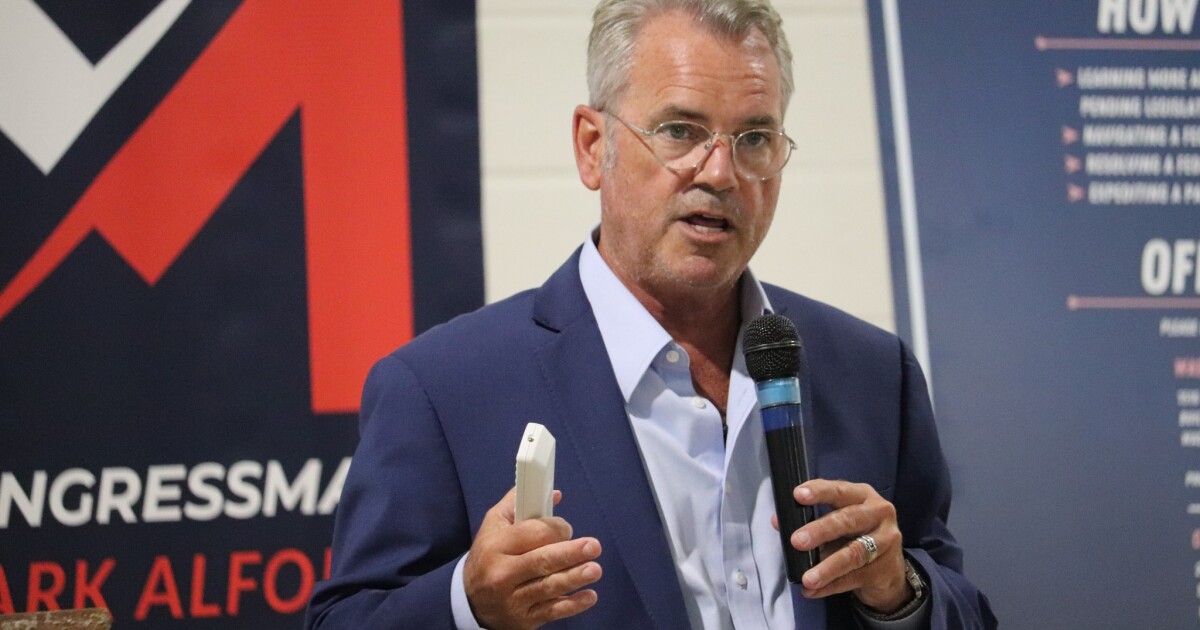Politics
Missouri Corrections fined $60K for Sunshine Law violations

The Missouri Department of Corrections must pay more than $60,000 for refusing to give records to a mother trying to find out how her son died in 2021 while in state custody.And that amount could grow, both because the department lost an appeal of an order finding it violated the Sunshine Law and because the mother is now suing the state for wrongful death in her son’s death by suicide.The wrongful death lawsuit asserts the department, its officers and contract medical provider were “negligent, derelict, reckless and in breach of their ministerial duties” in the death of Jahi Hynes.In a decision delivered Tuesday, the Western District Court of Appeals upheld a trial court judgment that the prison agency committed a “knowing and purposeful violation of the Sunshine Law” to prevent Willa Hynes of St. Louis from learning her son hanged himself with a bedsheet while in solitary confinement.The department asserted the records were inmate medical records protected from disclosure and its investigation was not a law enforcement investigation as defined in the Sunshine Law. The appeals court rejected the first argument and did not address the second.“We find there was substantial evidence from which the trial court could have found the DOC acted with the intent to achieve some purpose by violating the Sunshine Law, namely, to hinder Hynes from pursuing a potential civil claim against the DOC relating to her son’s death,” Judge Edward Ardini wrote in the unanimous decision. “Such conduct amounts to a purposeful violation.”The ruling sets a precedent for the department’s Sunshine Law policies at a time when deaths are increasing in state prisons. Activists for prison reform have tracked deaths and found that deaths have increased by one-third as prison populations fell nearly 25%.From 2012 to 2014, there was an average of 31,442 incarcerated people in state prisons. Deaths averaged 89 per year. Over the past three years, with an average of 23,409 incarcerated people in state prisons, deaths have averaged 122 per year.There have been more than 100 deaths in Missouri prisons in five of the last six years.Michelle Smith, director of the Missouri Justice Coalition, said at a January memorial service for deceased inmates that the department routinely withholds information about deaths from family members.“We are trying to raise awareness of the fact that hundreds of people die in Missouri prisons every single year and nothing is done,” Smith said at the memorial service.On April 1, Hynes filed a wrongful death lawsuit accusing the department, its contract medical providers and 11 corrections employees of negligence in allowing her son to possess the bedsheet and failing to conduct required checks on inmates in administrative segregation.
Rudi Keller
/
Missouri IndependentLaShon Hudson, mother of Michael Hudson, speaks last January during a memorial service for the 364 Missourians who died in state custody from 2021-2023. Hudson was accompanied to the microphone by family members, left, and Michelle Smith, director of the Missouri Justice Coalition.
The department used every means possible to block access to information about the death, attorney Linda Powers, who represents Hynes, said in an interview with The Independent.“They are doing death investigations internally without involving outside law enforcement and then skirting the requirements of the Sunshine Law that law enforcement produce investigative records by claiming they are not law enforcement,” Powers said.Karen Pojmann, spokeswoman for the corrections department, declined to answer questions about the department’s Sunshine Law practices and if they have changed as a result of Hynes’ lawsuit. She also declined to comment on the wrongful death lawsuit.“The department doesn’t comment on litigation,” Pojmann wrote in an email.The Sunshine Law penalty includes a $5,000 fine for the knowing violation and more than $55,000 in attorney fees.In her request, Hynes asked for all of her son’s records since his incarceration, plus his medical records, the investigative report on his death, and surveillance video of the area where he was in administrative segregation.All of the material was turned over late last year, but not before Cole County Circuit Judge Daniel Green issued an order giving the department five days to comply with his judgment in full. That order was issued after Powers asked Green to enforce the judgment and the records were produced only after she sought contempt sanctions because the department had done nothing for four additional weeks.The investigative report, Powers said, was a document seemingly written to protect the department from liability, not to relate the truth about Jahi Hynes’ death.“When you look at the evidence and what the video shows, you can determine what happened,” Powers said.The video and other documents withheld by the corrections department until the court order form the basis of the factual allegations in the lawsuit, Powers said.Jahi Hynes was sentenced in 2013 in St. Louis Circuit Court to 13 years in prison for first degree robbery. He was 27 when died April 4, 2021, at the Southeast Missouri Correctional Center in Charleston.He had a history of mental health problems, the lawsuit states. In September 2020, while housed at South Central Correctional Center in Licking, he spoke with a mental health professional about extreme mood swings and his history of hospitalizations for attempted suicide. He asked to be put back on psychotropic medications he had not been taking since he was incarcerated.Jahi Hynes was denied the medication and about three months after his transfer to the Southeast Correctional Center, the lawsuit states, he was cited for a “minor assault” for allowing his food port door to strike a correction officer’s hand, causing abrasions.He was moved to the administrative segregation unit, and placed on restrictions for allowed personal property intended to prevent inmates from harming themselves. On the first day, Hynes was only to be allowed boxer shorts and eyeglasses, receiving pants, a blanket and a mattress the next day and allowed shoes, socks, and bed sheets on the fourth day.The lawsuit states that department regulations require checks at least every 30 minutes on inmates in solitary confinement. There were periods of more than five hours where no checks were made, the video surveillance shows, according to the lawsuit.The surveillance video also shows the ease at which prisoners cut off from contact with other inmates can trade items on strings run from cell to cell in a system called “cadillacing.”While he wasn’t supposed to have pants, the video shows an inmate working as a porter giving him a pair of sweatpants taken from Hynes and placed on a hook outside the cell just four hours after being placed in the cell.One inmate gave Hynes a bedsheet via the cadillacing system and another gave him a T-shirt. The system is elaborate enough to transfer items from one side of the prison wing to the other and from one floor to another.“From approximately 11:09 a.m. to 11:45 a.m. (April 4), in plain view of the cameras, using the line secured by the offender, the inmates cadillaced items from one side of C-Wing to the other four times,” the lawsuit states.At 3:26 p.m., Jahi Hynes was found hanging in his cell, from the bedsheet he had received from the other prisoner, wearing the T-shirt and sweatpants. A corrections officer had done a cell check about a half-hour earlier and seen Hynes had the prohibited items.“None of the defendant correction officers removed the t-shirt, pants or bed sheets that were cadillaced to decedent from decedent’s cell, despite orders mandating that they do so,” the lawsuit states.The delays in receiving the information compounded Willa Hynes grief over the death of her son, Powers said.“It is unconscionable,” she said. “Ms. Hynes went two-and-a-half years wondering what happened to her son.”This story was originally published by The Missouri Independent, part of the States Newsroom.
Politics
Petition to legalize abortion in Missouri turns in signatures
A petition seeking to place abortion rights in the Missouri Constitution collected more than double the number of signatures needed to place the issue on the ballot.Missourians for Constitutional Freedom said the group turned in more than 380,000 signatures to the secretary of state’s office on Friday. The number needed to place a proposed constitutional amendment on the ballot is roughly 171,000.Speaking to a group of supporters at the Capitol on Friday morning, Kennedy Moore with Abortion Action Missouri said signatures were gathered in all of Missouri’s 114 counties.“That shows that Missourians in every corner of the Show-Me State don’t want to be subjected to abortion bans,” Moore said. “They don’t want to live in a state that restricts access to and puts medical decisions in the hands of politicians.”For a proposed amendment to make it onto the ballot, signatures must be collected by 8% of legal voters in six of Missouri’s eight congressional districts. The group said it achieved that threshold in six districts.Now, the signatures go to the secretary of state’s office to be verified.Tori Schafer with the ACLU of Missouri said there should not be any hiccups over the signatures in the coming weeks because “we clearly followed the law.”“We are of course preparing for anything, and we’re confident that any attacks that we experienced are politically motivated and we’ll win again in court,” Schafer said.
Sarah Kellogg
/
St. Louis Public Radio Tori Schafer, with the ACLU of Missouri, speaks to supporters of an initiative petition that seeks to enshrine abortion rights in the state constitution on Friday.
The proposed petitions faced multiple lawsuits that ultimately shortened the length of time the organization had to collect signatures.One of the suits was over the amendment’s fiscal note, where the auditor and secretary of state’s office disagreed over who had the authority to finalize the note.Attorney General Andrew Bailey’s office refused to approve the note created by Auditor Scott Fitzpatrick issued on the petition. Bailey’s office wanted Fitzpatrick to redo it to say the abortion ban would cost Missouri billions of dollars.Both a Cole County circuit judge and the Missouri Supreme Court ruled against Bailey.The other lawsuit was over the wording of the ballot language initially issued by Secretary of State Jay Ashcroft.The Missouri Western Court of Appeals ruled that Ashcroft’s summaries contained politically partisan language. The court also upheld, with few changes, a revised summary written by Cole County Circuit Judge Jon Beetem.“In March of 2023, we filed this amendment to end our state’s abortion ban, and immediately we were met with political attacks. State officials used the legal system to delay us from collecting signatures,” Schafer said.Unless Ashcroft expedites the signature counting process, Missourians will likely vote on the issue in November if the issue is placed on the ballot.
Sarah Kellogg
/
St. Louis Public Radio A “Decline to Sign” sign hangs on the office door of Sen. Nick Schroer, R-Defiance. Schroer participated this week in a filibuster of over 40 hours in an effort to bring forward a resolution that if passed by voters, would make it harder to amend Missouri’s constitution. The filibuster ended without that resolution being taken up.
The prospect of abortion rights being on the ballot spurred anti-abortion activists to try to stop people from signing the petition.“In our Decline to Sign Campaign, Missouri Right to Life has educated and activated countless Missourians to fight the battle to ‘Keep Missouri Pro-Life!'” Missouri Right to Life said in a statement.It has also renewed calls for the passage of a proposed constitutional amendment that would make it harder to change Missouri’s constitution.This week, a faction of state senators filibustered for more than 40 hours in an attempt to bring forward and pass a resolution that would require any proposed constitutional amendment to win both a simple majority of voters and a majority in each of Missouri’s eight congressional districts to take effect.“Here we are today, in the midst of one of the longest filibusters that this chamber has seen this year in order to bring to fruition our efforts to protect the constitution of this state from the abortionists who are trying to enshrine the institution of death into the constitution,” Sen. Bill Eigel, R-Weldon Spring, said.Ultimately, the filibuster ended before that resolution passed. There are two weeks left in the 2024 legislative session.The deadline to turn in signatures for proposed constitutional amendments or state law changes is May 5.Other groups that have turned in their signatures include one advocating for a state law change to raise the minimum wage and another that seeks to legalize sports betting.
Politics
Congressman Alford says the U.S. must continue to support Taiwan

It’s been over a week since Congress put the finishing touches on a foreign aid package to help Ukraine, Israel and Taiwan.And while much of the attention and focus is around opposition to providing military assistance to Ukraine and Israel, there’s been less debate about helping Taiwan blunt any potential invasion from China.U.S. Rep. Mark Alford, R-Cass County, recently traveled to Taiwan as part of a bipartisan delegation. In an interview earlier this week on the Politically Speaking Hour on St. Louis on the Air, Alford stressed that both Congress and the executive branch need to remain focused on stemming China’s growing influence.“I know we don’t officially recognize them as a nation, but they are very independent-minded people, a beautiful island that needs our help,” Alford said. “They need our help in deterring the Communist Chinese from further aggression.”China has long maintained that Taiwan is part of its territory, even though Taiwan is a representative democratic republic compared to China’s one-party communist state.When asked if the $8 billion in aid to Taiwan could provide an inference that the United States considers the island to be an independent country, Alford replied, “I think that’s always a possibility.”Recent polling shows that the vast majority of Taiwanese respondents prefer the status quo, as opposed to reunification with China or a declaration of independence.“We do have key provisions of the Taiwan Relations Act, which include making available to Taiwan the defense articles and services that they need to maintain a sufficient self defense capability,” Alford said. “That’s what we’ve agreed to, and we need to live up to that capability, no matter what lies down the road. It’s the same as President Reagan said, peace through strength.”China is nearly 60 times larger in terms of population than Taiwan — which Alford acknowledged would make any Chinese potential invasion daunting to combat.He added that it makes sense to aid the Taiwanese when China is trying to expand its reach around the globe.“They are building investments through the Belt and Road Initiative in our hemisphere. They are intent on having an influence,” Alford said. “They’re building ports, airports, seaports, roadways, and bridges to where they can exert pressure on these nations, and supplant us as a leading economic and world power.”Alford voted for Israel aid but against Ukraine assistanceMembers of the House had the opportunity to vote on whether to aid Ukraine, Taiwan and Israel separately. Alford backed military assistance for Israel but voted against aiding Ukraine.Some Republicans, including former President Donald Trump, suggested that aid to Ukraine should come in the form of a loan. But there’s been no such push to make aid to Israel or Taiwan a loan even though the governments in both countries could hypothetically pay for military equipment themselves.
Rep. Alford joins the Politically Speaking Hour on St. Louis on the Air
Alford said aiding Taiwan makes sense, but a war with China could have a devastating impact on the world economy. He also said it was important to aid Israel because “they are a leader, a beacon of hope and freedom and democracy in the Mideast.”“I believe that they are God’s chosen people, that this is their land, they are willing to live in harmony if those other people who are in that land are willing to live alongside them as well,” Alford said. “But that has been the issue. They do not want Israel to be there. They do not want the State of Israel to exist.”Alford has been against Ukrainian aid because he said U.S. military personnel can’t provide a clear case about what “victory looks like.”“Taxpayers should not be continuing to fund this mission until we know what victory is defined as,” he said.“St. Louis on the Air” brings you the stories of St. Louis and the people who live, work and create in our region. The show is produced by Ulaa Kuziez, Miya Norfleet, Emily Woodbury, Danny Wicentowski, Elaine Cha and Alex Heuer. The audio engineer is Aaron Doerr, and the production intern is Roshae Hemmings. Send questions and comments about this story to talk@stlpr.org.Send questions and comments about this story to feedback@stlpublicradio.org.
Politics
Bailey’s Missouri trans tip line flooded with pro-trans support
A tip line created by Missouri Attorney General Andrew Bailey to collect complaints about gender-affirming care received thousands of responses before it was shut down in April 2023.At the time, Bailey’s office provided little explanation beyond suggesting that the service had been hacked by “far left activists…trying to impede parents’ ability to shed light on what happened to their children.”But records obtained by St. Louis Public Radio through a Sunshine Request show a different story playing out in the short-lived tip line: Its first 48 hours of existence cover thousands of pages and more than 400 emails. Despite Bailey’s call for the public to provide accounts of abuse at the Washington University Transgender Center at St. Louis Children’s Hospital, the majority of the tip line’s first replies defended gender-affirming care, praised the clinic and instead used the provided form to submit complaints about Bailey and the tip line itself.Becky Hormuth, a teacher and mother of a 17-year-old trans child, made one of the first replies that came into the tip line on March 23, 2023. In her message, she wrote that Bailey was “trying to bully and dismiss the rights my husband and I have as parents.”Looking back on her response a year ago, Hormuth said she was fearful that the tip line would become a tool used by Republican lawmakers in their efforts to end trans care in Missouri. She saw it as a potential danger.“I was afraid of it, not just for our family and my child in general, but for all transgender individuals in Missouri,” she told St. Louis on the Air. “I felt like it was a hunt to find evidence of something that was unfounded….It’s harming my family.”The tip line lasted only a month, ending on April 21, 2023 — but Bailey’s efforts were followed weeks later by a trans care ban passed by Missouri’s Republican-majority legislature. Although that law seemingly included an exception for trans minors already receiving care, in August, Washington University announced it would no longer provide gender-affirming care to patients under 18, citing “unsustainable liability for health-care professionals” triggered by the new law.One of those patients turned away from the clinic was Hormuth’s son, Levi. He now travels to Illinois to receive gender-affirming care like testosterone.When he and his mother found out about the clinic closing its doors to trans kids, “we kind of broke down,” Levi recalled. “My mom, she immediately started calling into places outside of the state, because nobody in state would take anybody more or take new patients. So we had to resort to Illinois. And that took more extra time to get into that clinic. It was emotional and scary and horrible to go through. But we were able to adapt.”Bailey’s investigation of the clinic is ongoing. His office did not respond to questions from St. Louis on the Air about the total number of respondents to the tip line or what role the complaints have in the investigation.Although they do not contain evidence of hacking, the records of the tip line’s first 48 hours appear to confirm reports of activists trying to jam the service with trolling, jokes and insults directed at Bailey. One March 23 email began with the script of the 2007 animated film “Bee Movie” and continued for more than 2,800 pages.To hear more about Andrew Bailey’s trans tip line and how it affected trans people and families, listen to St. Louis on the Air on Apple Podcast or Spotify or by clicking the play button below.
Records reveal responses to Andrew Bailey’s trans tip line
“St. Louis on the Air” brings you the stories of St. Louis and the people who live, work and create in our region. The show is produced by Miya Norfleet, Emily Woodbury, Danny Wicentowski, Elaine Cha and Alex Heuer. Roshae Hemmings is our production assistant. The audio engineer is Aaron Doerr. Send questions and comments about this story to talk@stlpr.org.
-

 Entertainment1 year ago
Entertainment1 year agoSt.Louis Man Sounds Just Like Whitley Hewsten, Plans on Performing At The Shayfitz Arena.
-

 Business1 year ago
Business1 year agoWe Live Here Auténtico! | The Hispanic Chamber | Community and Connection Central
-
Board Bills1 year ago
2022-2023 Board Bill 189 — Public Works and Improvement Program at the Airport
-

 Local News1 year ago
Local News1 year agoVIDEO: St. Louis Visitor Has Meltdown on TikTok Over Gunshots
-

 News1 year ago
News1 year agoTed Lasso-inspired pop-up bar now open in St. Louis
-

 Board Bills1 year ago
Board Bills1 year ago2022-2023 Board Bill 165 — Jefferson Arms Community Improvement District
-
Board Bills1 year ago
2022-2023 Board Bill 183 — Amending Ordinance Number 62885 known as the Capital Improvements Sales Tax
-
Board Bills1 year ago
2022-2023 Board Bill 180 — Right to Counsel for Tenants Facing Eviction




